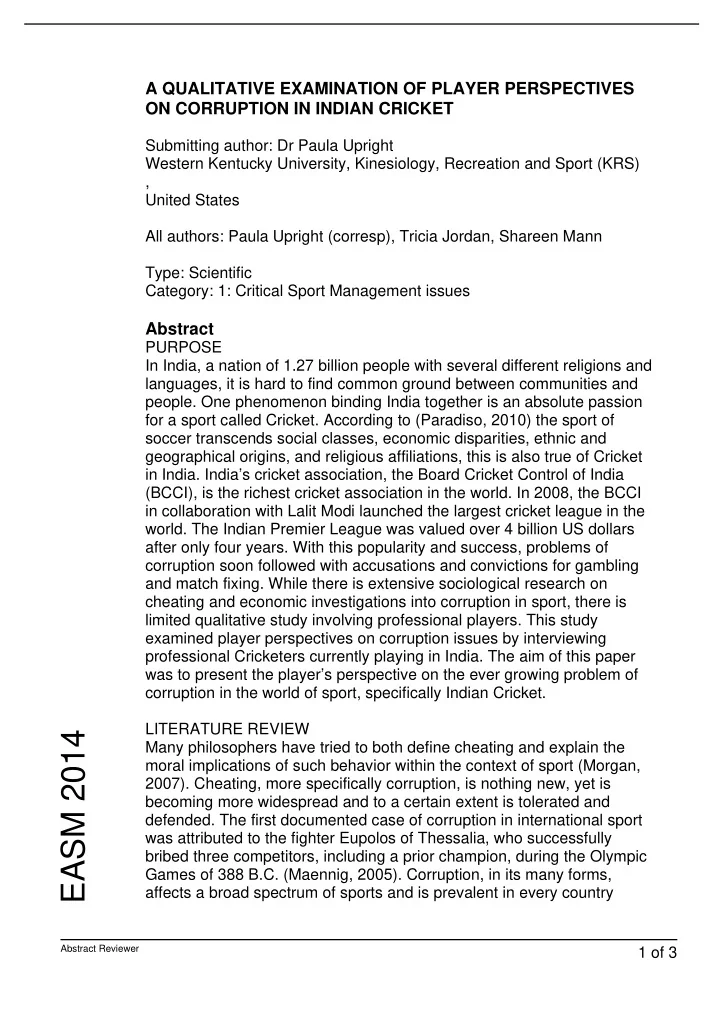

A QUALITATIVE EXAMINATION OF PLAYER PERSPECTIVES ON CORRUPTION IN INDIAN CRICKET Submitting author: Dr Paula Upright Western Kentucky University, Kinesiology, Recreation and Sport (KRS) , United States All authors: Paula Upright (corresp), Tricia Jordan, Shareen Mann Type: Scientific Category: 1: Critical Sport Management issues Abstract PURPOSE� In India, a nation of 1.27 billion people with several different religions and languages, it is hard to find common ground between communities and people. One phenomenon binding India together is an absolute passion for a sport called Cricket. According to (Paradiso, 2010) the sport of soccer transcends social classes, economic disparities, ethnic and geographical origins, and religious affiliations, this is also true of Cricket in India. India’s cricket association, the Board Cricket Control of India (BCCI), is the richest cricket association in the world. In 2008, the BCCI in collaboration with Lalit Modi launched the largest cricket league in the world. The Indian Premier League was valued over 4 billion US dollars after only four years. With this popularity and success, problems of corruption soon followed with accusations and convictions for gambling and match fixing. While there is extensive sociological research on cheating and economic investigations into corruption in sport, there is limited qualitative study involving professional players. This study examined player perspectives on corruption issues by interviewing professional Cricketers currently playing in India. The aim of this paper was to present the player’s perspective on the ever growing problem of corruption in the world of sport, specifically Indian Cricket. � � LITERATURE REVIEW� EASM 2014 Many philosophers have tried to both define cheating and explain the moral implications of such behavior within the context of sport (Morgan, 2007). Cheating, more specifically corruption, is nothing new, yet is becoming more widespread and to a certain extent is tolerated and defended. The first documented case of corruption in international sport was attributed to the fighter Eupolos of Thessalia, who successfully bribed three competitors, including a prior champion, during the Olympic Games of 388 B.C. (Maennig, 2005). Corruption, in its many forms, affects a broad spectrum of sports and is prevalent in every country Abstract Reviewer 1 of 3
(Maennig, 2005). Sport plays an important social, cultural, political and economic role across the world which contributes to corruption and fraud issues we currently face as sport managers (Brooks, Aleem & Button, 2013). There is difficulty in managing corruption due to definitions and laws unique to each sport and the country where it is played. However, according to Bowman and Gilligan (2007) there are consistent elements of corruption such as misuse of power, violation of trust and position, and personal or organizational financial benefits. � � METHODOLOGY� This was a qualitative study examining Indian Cricket corruption issues from the player’s perspective. The characteristics of qualitative research include eliciting understanding and meaning, the researcher as the primary instrument, an inductive orientation to analysis and richly descriptive findings (Patton, 2002). This type of research does not provide a cause and effect relationship. Data collection for this study included interviewing professional cricketers and extensive document mining of the relevant literature. The researchers designed semi- structured and open-ended questions, interviewing 5 professional Indian cricketers via Skype. The hour long interviews were recorded and transcribed for accuracy. � Data analysis employed an inductive process of comparing and coding the data. Using a line by line analysis, the researchers made conclusions by categorizing, coding and connecting categories. Data were compressed and linked together in a description that conveyed meaning. Finally, four distinct themes emerged that helped to explain the professional cricketer’s viewpoint on corruption in the most popular sport in India. � � RESULTS/ DISCUSSION� Theme 1: Cricket is a vital part of Indian culture, its importance and meaning cannot be fully explained to those outside of India. � Theme 2: Professional cricketers believe the influence of money and fame is the reason for current corruption issues in sports at all levels.� Theme 3: Players are more to blame for the corruption than coaches or the administrators of governing organizations.� Theme 4: Cricket is the most important sport in India and corruption is an issue but does not ultimately harm the popularity or the importance of the EASM 2014 game.� The results provide a description of player perspectives regarding the problems in Indian Cricket. Having the opportunity to examine player opinions toward a sensitive and highly controversial topic was unique for this country and in sport management research. The complete paper provides direct quotes to support the emergent themes. Player responsibility, financial motives and the tolerance for corruption were consistent. The passion for the game of Cricket is a social phenomenon in India and warrants further research. Love for sport and willingness to win at all costs is an international trend and warrants further study. Abstract Reviewer 2 of 3
Future research into solutions should also include player’s perspectives and concerns as presented here. References Brooks, G., Aleem, A., & Button, M. (2013) Fraud, corruption and sport. New York: Palgrave & Macmillan.� � Maennig, W. (2005). Corruption in international sports and sport management: Forms, tendencies, extent and countermeasures, European Sport Management Quarterly, 5(2), 187-225. � � Morgan, W.J. (2007). Ethics in sport. (2nd Ed.) Champaign, IL: Human Kinetics. � � Paradiso, E. (2010) Corruption and politics in Argentine soccer (Unpublished master’s thesis). Dalhousie University, Halifax, Nova Scotia.� � Patton, M.Q. (2002). Qualitative research and evaluation methods. (3rd Ed.). Thousand Oaks, CA: Sage Publications, Inc. EASM 2014 Abstract Reviewer 3 of 3
Recommend
More recommend